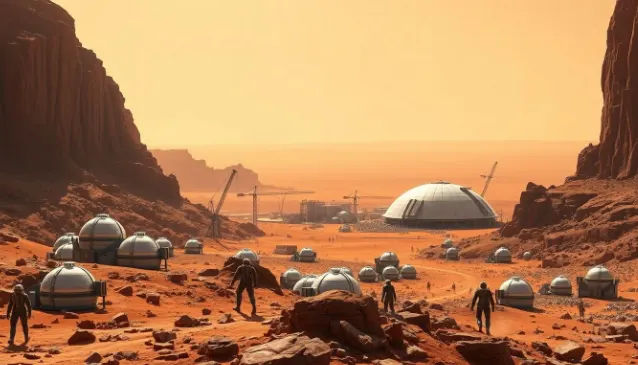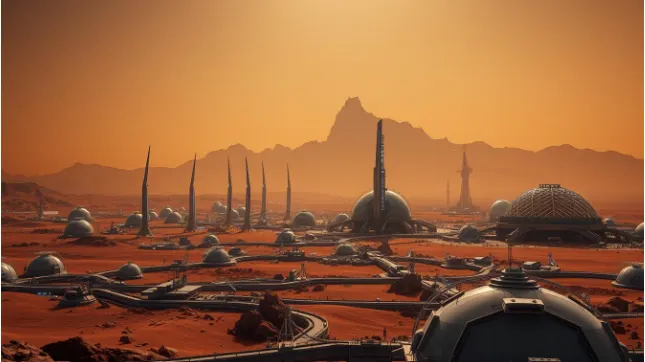The creation of a human settlement on Mars is becoming quite a realistic possibility, as major investments in Mars Colonization technology by both governmental and non-governmental agencies and individual companies are concentrated there.
The idea of a Martian city evokes both enthusiasm and interest in the future of Space Exploration. When we speculate about the possibilities, we have to look at the present situation of space colonization efforts, and the obstacles we have to face.
There are many hurdles that must be overcome in the process of making a Martian city a reality, including technological challenges and other logistical challenges.
Key Takeaways
- Mars colonization is picking up speed as both government agencies and private companies invest in it.
- A Martian city is a great milestone when it comes to Space Exploration.
- There are technological and logistical obstacles that will have to be overcome in order to create a sustainable settlement on Mars.
- The future of life in space.
- This is because Mars colonization efforts cannot succeed without advancement in technology.
Status of Space Colonization.
As the technology continues to progress, the idea of colonizing space is turning into a reality. The scenery is fast changing under the influence of the governmental agencies and the private businesses.
NASA and International Space Station Developments.
NASA has been leading in the space exploration field and the International Space Station (ISS) is one achievement. The ISS has been an invaluable source of knowledge about long-term space habitation and a testing ground of the technologies and strategies that will play a major role in future missions to Mars and beyond.
The experience of the ISS has played a crucial role in understanding how difficult it is to maintain life in space, how to allocate resources, and reduce the impact of microgravity on the human body.
Mars Race by Private Companies.
The move towards Mars colonization is becoming more and more dependent on private firms. Of these, SpaceX is the most ambitious one.
Mars Colonization Plans at SpaceX.
SpaceX is working on the Starship program, a reusable next-generation spacecraft that will carry passengers and cargo to the Moon, Mars and other solar systems destinations. The Starship is an essential part of the Mars colonization program of SpaceX, the goal of which is to create a permanent, self-sustaining human settlement on Mars.
Starship is highly reusable, which means that the cost of access to space is much lower, and frequent launches can be performed. The technology is a game-changer in space industry to make missions to Mars more frequent and sustainable.
Other Space Commercial Ventures.
Other commercial space projects are also taking big steps beyond SpaceX. Other companies such as Blue Origin and Virgin Galactic are in the process of making space travel more affordable, but are currently focusing on suborbital flights and space tourism.
These newcomers are providing a competitive environment which is spurring new innovation and lowering prices, and this will benefit the space colonization project as a whole.
More recent Technological Breakthroughs.
The past few years have witnessed major technological advancements which play a critical role in the success of space colonization missions. The invention of more efficient engines, new propellants, and other innovations in propulsion systems are making the faster and more sustainable travel to Mars possible.
Also, human life over long-duration missions depends heavily on the enhancement of life support systems, such as air recycling, water purification, and waste management.
The Problems of creating a City on Mars.
To establish a sustainable presence in Mars, it is necessary to overcome many environmental, engineering, and human adaptation challenges. The Martian world is too severe and the temperature, radiation and absence of necessary resources are too severe.
Environmental Obstacles
The surface of Mars does not provide much shield against the cosmic radiations, which are dangerous to both people and electronic devices.
Radiation and Heat/Cold.
Of great concern is the impact of radiation on the surface of Mars. With extended exposure, health problems may develop due to cancer and central nervous system injury. Extremes of temperature also become an issue, because they can interfere with the operation of equipment and with the living conditions.
Resource Limitations
Mars is dry and lacks the basic resources like liquid water which is vital to the survival of humans. In order to sustain life on Mars, it is crucial to develop effective ways to extract water, generate food, and recycle resources.
| Resource | Availability on Mars | Potential Solutions |
| Water | Limited; present in ice form | Extraction through melting ice or atmospheric processing |
| Food | Not readily available | Hydroponics, aeroponics, or in-situ resource utilization |
| Energy | Solar energy available | Solar panels, nuclear reactors |
Infrastructure and Engineering Requirement.
To create habitats that may survive in the harsh environment of Mars is an important engineering project. This involves coming up with materials and structures that would shield against radiation and high temperatures.

Mars Colonization Pains.
Adaptation of man to Martian conditions.
The key to the success of any long-term mission is to understand how humans can adjust to the Martian environment in the long term. Studies of the psychological and physiological impact of long space travel and living on Mars are critical.
Through these challenges, we can get a step closer to a sustainable human presence on Mars, and the future of space habitation.
Space Habitation Beyond Mars.
Once we pass Mars, space habitation is more exciting and complicated. The next stage of Space Exploration is to create settlements on the moons of Jupiter and Saturn or even on the planet Earth. The technological breakthroughs that will be inspired by the desire to build a city on the Martian planet will probably have widespread ripple effects on Space Colonies overall.
The Future of Space is very promising and Space Technology has been developing a lot. And as we keep exploring the frontiers of space exploration and colonization, we need to think about the future of being a multi-planetary species.
FAQ
What is martian colonization doing?
Companies such as SpaceX and NASA are currently in the process of colonizing Mars and space technology has made a major leap, with reusable rockets and life support system.
What are the primary issues of a Mars city?
The biggest challenges are environmental challenges such as radiation exposure and extreme temperatures, engineering and infrastructure needs, such as building habitats and creating efficient resource harvesting processes.
What can humans do to fit in the Martian world?
Learning how humans can adapt to the Martian conditions is pivotal to the overall success of the mission long-term. Studies are being carried out on the impacts of long term exposure to the Martian gravity, radiation and isolation.
What is the position of commercial enterprises in colonization of Mars?
SpaceX and other private firms are pioneering innovations in space, with Mars colonization planned, such as building reusable rockets, and the Starship program.
What might the future consequences of being a multi-planetary species turn out to be?
A human colony on Mars and beyond will also create expansive consequences on human habitation in space, leading to further technological developments, and possibly opening the door to colonies on other planets and moons.
What will become of resources in Mars?
Trusted ways to extract water, create life, and recycle resources will be key to maintaining a human presence on Mars, and technologies such as in-situ resource utilization (ISRU) are being developed.
Why is NASA International Space Station (ISS) important as far as Mars colonization is concerned?
ISS offers some important lessons to long-term space habitation, which will allow researchers to learn the impact of microgravity over time and guide the design of future missions into space.


